Existing User Log In
New User Registration
Register for a free account to gain full access to the VGChartz Network and join our thriving community.



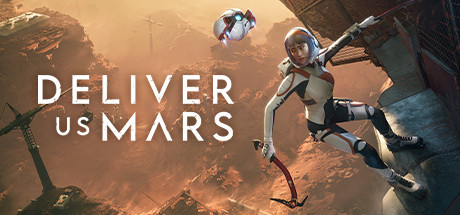

America - Front
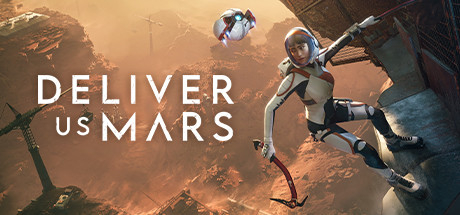

America - Back

KeokeN Interactive
Adventure
 (Add Date)
(Add Date) (Add Date)
(Add Date) (Add Date)
(Add Date)
| Owners: | 0 |
| Favorite: | 0 |
| Tracked: | 0 |
| Wishlist: | 0 |
| Now Playing: | 0 |
After successfully taking one giant leap for mankind in Deliver Us The Moon, it's only natural to ask what's on the horizon. That drive to propel towards a greater endeavor is only natural for humans. This also maps onto KeokeN Interactive's own aims; having already captured the atmosphere of Earth's closest celestial body, grander aims like the red planet should come as no surprise. What’s more surprising is that despite the greater distance and loftier ambitions, Deliver Us Mars invests more interest in the personal stories and sacrifices.
This is immediately apparent by the presence of actual people. Whereas Moon's quasi-silent protagonist never doffed his helmet, only interacted with recorded holograms, and had his identity guarded until halfway through the campaign, Kathy Johanson's personality is at the forefront. Instead of Moon's basic premise of getting the power back on, Kathy has a relatable goal of reuniting with her father, Isaac, tied with the main mission. After Isaac had abandoned Kathy and her sister, Claire, to join a rogue faction (named "Outward") with three ARK colony ships that could hold the key to revitalizing Earth, he radios years later with a brief, choppy message. Knowing he and Outward made it safely to Mars, this catapults a last-ditch mission to recover this stolen equipment as a means of saving humanity.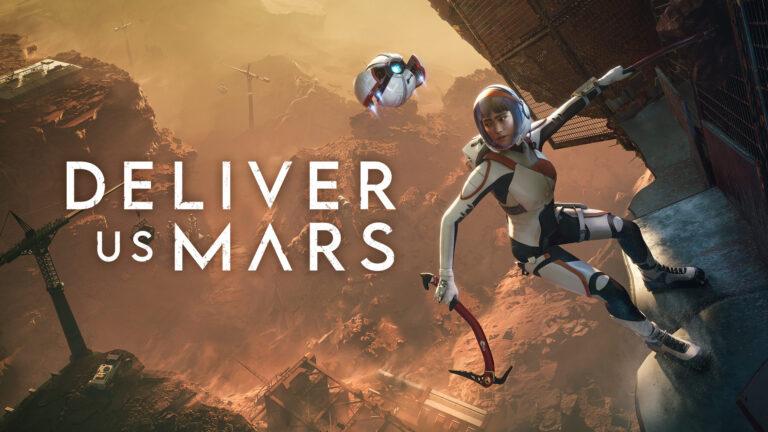
Even though Mars has a familiar skeleton to Moon's setup (narrative structure, game design, etc.), every piece feels more weighty and meaningful.
One of my favorite examples stems from the beginning itself. Whereas Moon's tutorialized opening is just this guy ultimately reaching the shuttle while an aggressive dust storm closes in, Mars' slower pace highlights Earth's privations with both the WSA (World Space Agency) and regular citizens. There was a brief period where I questioned if KeokeN's writers had totally disregarded their previous world-building, but that was quickly done away with upon reaching WSA’s headquarters. While also internalizing the goings-on with this agency, the subdued tension between Kathy & her sister, the haves/have-nots dilemma with rationed resources, and so on, there's an exhibit dedicated to telling the original's story. But unlike with that faceless hero, you don’t feel so distanced from the dire situation; each of Kathy's crew plays off each other (be it romantic or familial) and you’re directly experiencing the consequences of past actions.
This new territory is balanced out with older templates. Kathy is more of a conversationalist with her crew and her hovering robot companion, but you’re still exploring what seems to be an abandoned collection of bases on Mars filled with recorded holograms and collectibles. But the repetitive means of aligning your ASE drone in the right spot to disinter expositive recordings is interspersed with Kathy's own flashbacks and tension with the crew in cutscenes. There's more fertile ground to work with, especially since one crewmate semi-starring in Moon, Sarah Baker, still carries physical and psychological scars from Isaac.
This dynamic, along with Kathy's inherited stubbornness, compliments the uncomfortable tension with her father. While Isaac desperately misses his youngest (with the nickname "Moonbear"), you can tell there's an unsubtle power dynamic tied into it – especially when considering how mum he is about Claire. Through flashbacks and recordings, KeokeN does a good job avoiding a vapid dictatorial father figure for a mix between familial love and snivelling opportunist, the kind to mournfully say "oh dear… how could I do this?!" after violently plunging a dagger through someone's neck.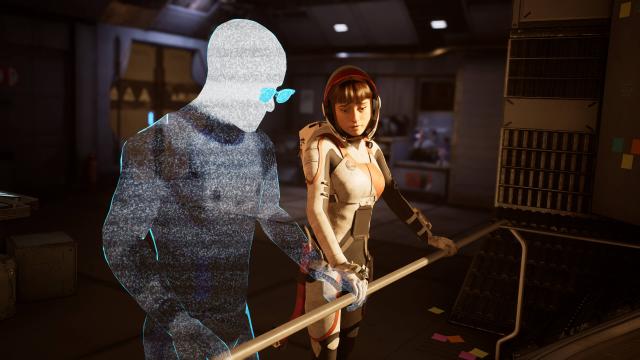
Although these extra storytelling tools are often used effectively, there’s always something halting its greater potential. Piecing past events together can be an effective framework, but also a potential burden when the audience can foretell plot points far in advance. There's also the occasional detour that feels like "…and then this happened" (as explained by Matt Stone & Trey Parker) versus being a building block for the plot or characters. Those types of issues, plus some character writing, are like a cluster of minor oxygen leaks around an otherwise sturdy hull.
It's also not helped by the mixed bag in presentation either. Certain aspects earn their paycheck, like some voice actors and Sander Van Zanten's soundtrack, but others show KoekeN bit off more than it could chew. Even if the NASA-esque architecture compliments the setting, and the writing typically captures the team's humanity, you can’t help but notice their plastic faces. It's like everyone in the future simultaneously agreed to get the modern-day Madonna look for kicks. Horrors beyond comprehension aside, a number of glitches invade several gameplay and story junctures. One particular example is an emotional cutscene where a supporting character simply… forgets her lines? Were it not for subtitles, I would've figured she didn't say anything.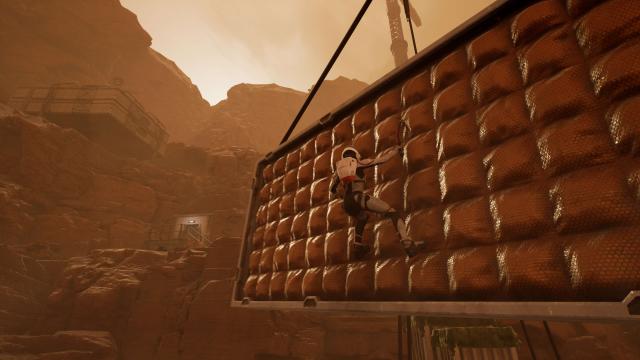
In keeping with mirroring Moon's story, the gameplay follows a similar template but with more interactive creativity; in fact, the beginning’s tempo follows closely to its predecessor beat to beat. When you get past the subtle tutorials and story setup, Kathy has to follow safety checks to launch the shuttle: pushing buttons in order, shifting levers, and so on. It grounds her (and you) in this momentous task while the rest of the crew handle their roles. Soon thereafter, you’re entering the vacuum of space in first-person while lasering off debris – remnants from a disaster caused in the original. As with Moon, it tries to capture the vastitude and inherent challenge in navigating space.
Even if more condensed and isolating, there are mental and physical challenges standing on dry land too. A new addition is Kathy's pair of climbing axes (a la modern Tomb Raider), where she'll have to navigate walls of rock, ice, or conveniently-placed solar padding. The simple control scheme communicates raw strength: ram either left or right spike in with the shoulder button, hold to secure that axe in place, and release to move your free arm to the next spot. It's an effective pacing mechanism, but quickly gets repetitive over time and annoying, as sometimes a seemingly-successful hit will bounce back; worse yet, a couple of rare occasions compelled me to restart since the game's systems wouldn’t allow Kathy to clamber over a platform's edge when she should.
When putting the axes away, the biggest gameplay pie slice comes back to puzzle-solving with beam energy. Similar to Moon, you'll maneuver trollies around and bounce these energy turrets to special nodes that demand a certain energy level to properly function. Eventually, beam splitters and transparent power reducers add a nice layer of complexity, making you manage different lines of sight and having multiple nodes powered at once. And while I like how they’re naturally incorporated into this grounded aesthetic, it only ramps up in modest difficulty late in the game.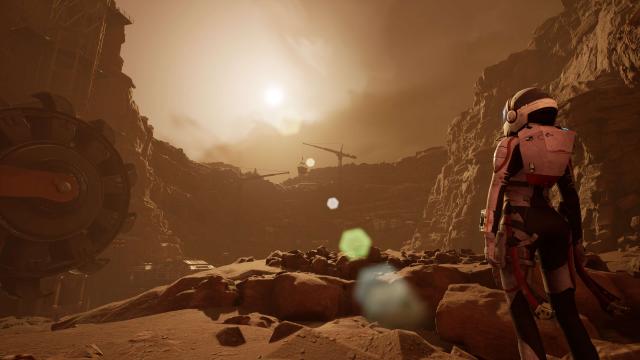
Credit where it's due: Mars excels past Moon's stultifying game design by both paring back the latter's wonkier ideas and incorporating some extra nuances. My main hang-up is if that's still enough. That isn't to disregard some notable improvements, especially so for having roughly double its precursor's runtime (8-9 hours). But within its evenly-balanced confection of 1st-person exploratory bits, puzzle-solving, platforming, cliff-climbing, and so on, no specific concept sticks with you. There's no long-lasting spark and it also launched in a rough state. There's a tension in simultaneously seeing marked improvement while also not capturing the true potential.
If nothing else, Deliver Us Mars fares better at being an engaging sci-fi action-adventure despite missing several of the most typical genre tropes. Before venturing towards our neighboring planet, KeokeN evaluated its predecessor's limited & mismanaged design to find a better balance in its combat-less, human-centered tale. But is that enough on its own? Because while its new storytelling and gameplay tools feel more finely-tuned, nothing ever really feels utterly enthralling either. I felt more passion for some of its obnoxious bugs than Kathy's admittedly-tangible drama. And like her building uncertainty as she neared the conclusion, it’s tough not to feel the same.









